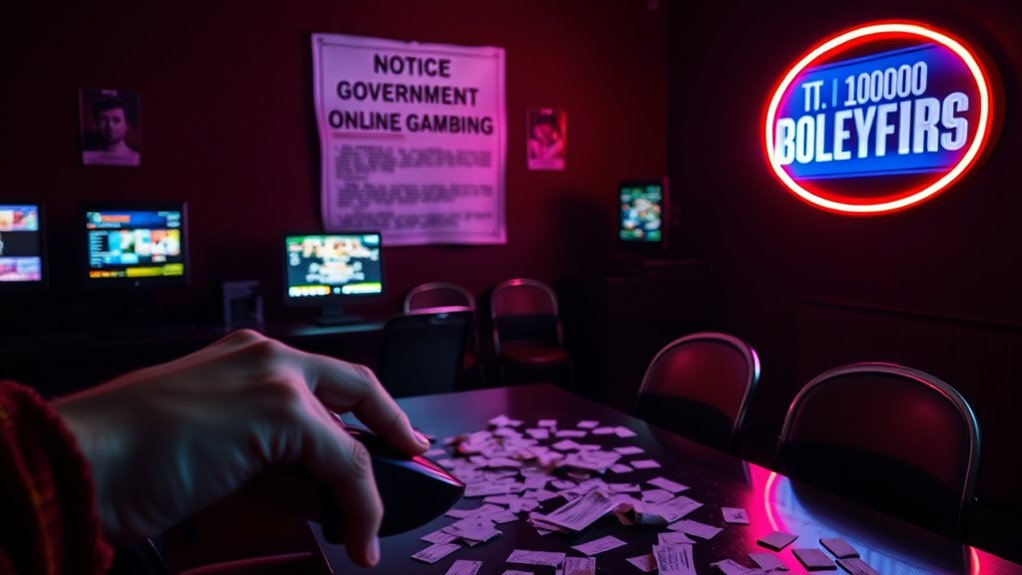The rise of online gambling in Southeast Asia has been remarkable, driven by platforms like Philippine Offshore Gaming Operators (POGOs). These operators have created jobs and boosted economies but also faced severe scrutiny due to criminal activities and regulatory issues. As governments clamp down on illegal operations and impose bans, the future of online gambling looks uncertain. If you’re curious about the complexities that lie ahead, there’s more to uncover about this evolving landscape.
Key Takeaways
- The online gambling market in Southeast Asia is projected to grow to US$73 billion by 2030, driven by significant player engagement, particularly from China.
- Philippine Offshore Gaming Operators (POGOs) contributed to economic growth but faced bans due to legal issues and scrutiny over criminal activities.
- Over 5,800 POGO-related crimes between 2017 and May 2023 highlighted serious concerns, including kidnapping and human trafficking.
- Regulatory responses intensified, with governments cracking down on illegal operations and tightening oversight of POGOs to combat lawlessness.
- The shift from physical casinos to online platforms has reshaped the gaming landscape, reflecting changing consumer preferences in the region.
The Growth of Online Gambling in Southeast Asia

As online gambling continues to gain traction across Southeast Asia, you might notice billboards advertising gaming services popping up in bustling cities like Manila.
This shift from physical casinos to online platforms is reshaping the gaming landscape. With projections estimating the market will reach US$73 billion by 2030, the allure is undeniable.
Many players are drawn in, particularly from China, where gambling restrictions fuel interest in Southeast Asian options. In Indonesia alone, 2.7 million individuals engaged in online gambling last year, highlighting the region’s explosive growth and the increasing popularity of digital gaming experiences.
The Role of Philippine Offshore Gaming Operators (POGOs)

Philippine Offshore Gaming Operators (POGOs) play a notable role in the online gambling landscape, particularly in the Philippines.
These entities have reshaped the market by attracting foreign investment and creating jobs while also raising concerns about regulation and criminal activities.
Key aspects include:
- Foreign Ownership: POGOs are primarily foreign-owned, with many operators coming from China.
- Job Creation: They’ve generated thousands of jobs for both locals and expatriates.
- Economic Impact: POGOs considerably contributed to the economy through tax revenues, despite facing increasing scrutiny and eventual bans due to legal and societal issues.
Economic Contributions and Challenges of POGOs

While POGOs have significantly boosted the Philippine economy through job creation and tax revenues, their presence also brings considerable challenges that can’t be ignored.
You’ve likely seen the influx of foreign workers and the demand for real estate and services. However, the ban on POGOs has led to job losses and a decline in tax income, leaving many Filipinos in a tough spot.
Additionally, the government now faces the formidable task of managing the fallout from illegal operations that may rise in response to the ban.
Balancing economic benefits with regulatory challenges remains a complex endeavor for the Philippines.
Criminal Activities Linked to Online Gambling

The economic benefits of POGOs come with serious consequences, particularly in the domain of criminal activities.
You might be shocked to learn that POGOs are linked to various crimes, undermining their positive image.
Consider these alarming points:
- Over 5,800 POGO-related crimes reported from 2017 to May 2023, including kidnapping and murder.
- Raids uncovered scam centers exploiting human trafficking victims, revealing horrific abuses.
- The Philippine Anti-Money Laundering Council flagged US$237 million in suspicious transactions, indicating money laundering activities.
These issues highlight the dark side of online gambling, prompting urgent calls for reform and stricter oversight.
Regulatory Responses and Government Crackdown

As concerns over criminal activities and regulatory challenges mounted, a crackdown on POGOs became inevitable.
The Philippine government faced pressure to address illegal operations, leading to the suspension of numerous licenses. With accusations of POGOs acting as fronts for espionage, public support for the ban surged; about 80% of Filipinos wanted them outlawed.
President Joko Widodo of Indonesia also joined the fight, launching a task force against online gambling.
The Philippine Amusement and Gaming Corporation struggled to manage the industry, ultimately tightening regulations and enforcing bans to combat rampant lawlessness and protect citizens from the negative impact of online gambling.
The Impact of the POGO Ban on the Economy

Given the considerable contributions of Philippine Offshore Gaming Operators (POGOs) to the economy, the ban imposed in July 2023 has reverberated through various sectors.
You might notice a sharp decline in job opportunities, particularly for Filipinos and foreign workers. The real estate market also suffers as demand plummets.
- Tax revenue has dropped considerably, impacting government funding.
- Many businesses dependent on POGO operations face financial strain.
- Public sentiment has shifted, with increased support for stricter regulations on gambling.
The ban’s effects are profound, reshaping the economic landscape in ways that could take years to recover from.
The Future of Online Gambling in Southeast Asia

While many may view the POGO ban as a setback for the gambling industry, it could also signal a transformative shift in the future of online gambling in Southeast Asia.
As regulations tighten, you might see a rise in more transparent and responsible gaming platforms. Emerging jurisdictions could attract operators seeking safer havens, while local governments may innovate regulations to combat illegal activities.
Embracing technology, like cryptocurrencies, could offer both challenges and opportunities. Ultimately, the industry’s evolution will hinge on the balance between enforcement and market demand, shaping a new landscape for online gambling in the region.
Technological Evolution and Its Implications for Gambling Regulation

The shifting landscape of online gambling in Southeast Asia is increasingly influenced by technological advancements, which bring both opportunities and challenges for regulation.
You’ll find that new technologies complicate oversight, making it harder to track illegal operations.
Consider these implications:
- The rise of cryptocurrencies obscures financial transactions, complicating enforcement efforts.
- AI-driven marketing targets vulnerable populations, raising ethical concerns.
- Evolving platforms can easily shift into unregulated spaces, fostering underground operations.
As regulatory bodies struggle to keep pace, the future of gambling regulation hinges on adapting to these technological changes while safeguarding public interests.
Frequently Asked Questions
What Are the Legal Gambling Options in Southeast Asia?
In Southeast Asia, legal gambling options vary by country. In places like Singapore and Malaysia, you can enjoy regulated casinos and sports betting.
The Philippines offers licensed online gaming through Philippine Offshore Gaming Operators, while Thailand has state-run lotteries.
Vietnam allows limited forms of gambling, mainly for locals.
You should always check local laws, as regulations can change, and illegal gambling operations may pose risks.
Stay informed to guarantee a safe experience.
How Do Online Gambling Platforms Ensure Player Security?
Online gambling platforms guarantee your security by utilizing advanced encryption technologies to protect your personal and financial information.
They often implement robust identity verification processes, requiring you to confirm your identity before accessing your account.
Additionally, many platforms adhere to strict regulatory standards, conducting regular audits and employing responsible gaming measures.
You can also find features like self-exclusion options and deposit limits, helping you maintain control over your gambling activities and guaranteeing a safer gaming experience.
What Demographics Are Most Affected by Online Gambling?
Did you know that over 2.7 million Indonesians gambled online regularly last year?
When it comes to online gambling, young adults aged 18 to 34 are often the most affected demographic. You might find that they’re drawn in by the convenience and accessibility of these platforms.
Additionally, men typically represent a larger portion of online gamblers.
The financial and social impacts can be significant, influencing everything from personal relationships to economic stability.
Are There Support Resources for Gambling Addiction in the Region?
Yes, there are support resources for gambling addiction in the region.
You can find helplines, counseling services, and support groups aimed at helping individuals struggling with gambling issues. Organizations like Gamblers Anonymous operate in various countries, offering a community for sharing experiences and recovery strategies.
Many local health departments also provide resources and information on treatment options.
If you or someone you know is affected, reaching out can be the first step towards recovery.
How Do Cultural Attitudes Toward Gambling Vary Across Southeast Asia?
Cultural attitudes toward gambling in Southeast Asia are like a tapestry, woven from diverse threads.
In some countries, gambling’s embraced as a popular pastime, while in others, it’s frowned upon or outright banned.
You’ll find that places like Malaysia view it with suspicion due to religious beliefs, whereas in the Philippines, it often symbolizes entertainment and economic opportunity.
Your understanding of these nuances can help you navigate the region’s complex gambling landscape.
Conclusion
As the sun sets on the once-thriving online gambling scene in Southeast Asia, the shadows of its past linger, reminding us of the delicate dance between prosperity and peril. The future remains uncertain, like a flickering candle in the wind, yet opportunities for a more regulated and sustainable industry still exist. By embracing change and learning from past missteps, the region could forge a path that balances economic growth with societal well-being, illuminating a brighter horizon.









